by M. C. Jennings | Nov 6, 2015 | Academics, COBA Faculty, Research, Uncategorized
Dr. Ryan Jessup and Dr. Don Pope have teamed up to create the Jessup Pope NCAA Division I FBS rankings. Jessup, Assistant Professor of Marketing, teaches marketing research and data mining and Pope, Associate Professor of Management, teaches statistics and intro to management. These two great statistical minds decided to put their knowledge and experience to practical use in devising a new method of ranking college football teams. The blog today is written by Dr. Jessup as our COBA Blog guest writer.
I present to you the inaugural Jessup Pope NCAA Division I FBS rankings. This is a ranking of all 128 college football teams in the bowl subdivision based on the performances this season to date.
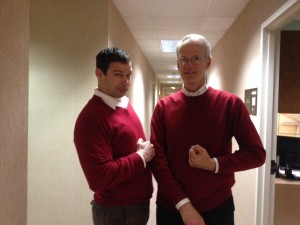
Dr. Ryan Jessup and Dr. Don Pope
A brief history
A few years ago, after the wildly improbable success of our faculty/staff intramural soccer team, the Sunflowers of Death (which is a topic for another time, but suffice it to say that we have finished 2nd place in 4 out of the 7 seasons we have played), we wanted to come up with a better way to rank sports teams.
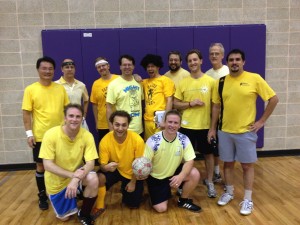
The Sunflowers of Death
With the help of our then-student worker, Amy Morris, we collected the data from multiple seasons of a variety of sports. Don Pope and I then took the Google PageRank algorithm, the algorithm that jump-started the search engine giant – and still underlies their current approach today – and made several modifications to it to allow it to rank teams, instead of webpages. We also enabled it to account for home field advantage and temporal decay of performances (this is where games early in the season weigh less in the rankings than more recent games), among other things. We then forecasted bowl games at the end of three seasons, finding that our algorithm correctly predicted the winner (1) more than 60% of the time, (2) better than the BCS (or its replacement, the College Football Playoff), and (3) even out-predicted the Las Vegas betting line 56% of the time. We presented this work at the Christian Scholars Conference in Abilene this past summer. More recently, with the help of several faculty in the SITC, most prominently Dr. Ray Pettit, I wrote a screen-scraper in python (a programming language) to scrape off all the information for each college football game so that we can begin looking at our rankings on a weekly basis.
The rankings
The effectiveness of the ranking system lies in the fact that it not only takes into account your team’s performance against other teams but also the other teams’ performance against other teams. So let’s take a quick look at these initial rankings. Some of these rankings accord with our expectations and others outrageously violate them. On one hand, quite reasonably, Notre Dame and Clemson are 1 and 2, and Alabama, Stanford, Michigan State, and Florida are all in the top 10. On the other hand, USC is No. 3, Texas is No. 16, whereas Ohio State and Baylor are No.’s 11 and 60, respectively, all apparently crazy! Given that they were just punished by Iowa State, I don’t believe that Texas is the 16th best team in the nation, but that aberrant win over Oklahoma at a neutral site is currently making Texas look very good. And what’s the deal with Baylor and Ohio State? Well, part of the issue is that Baylor and Ohio State are both in power conferences and began the season ranked in the top 5. Yet our system cares neither about which conference your team is in nor is it biased by preseason rankings: it only takes into account your team’s performances and the quality of the opponent (as judged by their performances against their opponents). So, apparently they have not played very strong opponents thus far.
I think as the weeks continue our rankings will begin to accord a bit more with our expectations but I won’t be terribly surprised if at the end of the season there are still some outrageous-looking rankings. You don’t beat the Vegas line 56% of the time by just heeding the status quo!
Here are our rankings at this time:
| Rank |
After Week 9 |
| 1 |
Notre Dame |
| 2 |
Clemson |
| 3 |
USC |
| 4 |
Florida |
| 5 |
Tennessee |
| 6 |
Alabama |
| 7 |
Oklahoma |
| 8 |
Stanford |
| 9 |
Michigan State |
| 10 |
Michigan |
| 11 |
Ohio State |
| 12 |
Utah |
| 13 |
Ole Miss |
| 14 |
LSU |
| 15 |
Georgia Tech |
| 16 |
Texas |
| 17 |
Washington |
| 18 |
TCU |
| 19 |
Mississippi State |
| 20 |
Wisconsin |
| 21 |
Florida State |
| 22 |
Virginia Tech |
| 23 |
Penn State |
| 24 |
Nebraska |
| 25 |
California |
| 26 |
Louisville |
| 27 |
Memphis |
| 28 |
Texas A&M |
| 29 |
Texas Tech |
| 30 |
Central Michigan |
| 31 |
Bowling Green |
| 32 |
East Carolina |
| 33 |
BYU |
| 34 |
Temple |
| 35 |
Oklahoma State |
| 36 |
Iowa |
| 37 |
Arkansas |
| 38 |
Pittsburgh |
| 39 |
Boise State |
| 40 |
UCLA |
| 41 |
Iowa State |
| 42 |
West Virginia |
| 43 |
Miami (FL) |
| 44 |
Northwestern |
| 45 |
Cincinnati |
| 46 |
Utah State |
| 47 |
Western Kentucky |
| 48 |
Oregon |
| 49 |
Tulsa |
| 50 |
Washington State |
| 51 |
Minnesota |
| 52 |
Boston College |
| 53 |
Louisiana Tech |
| 54 |
San Diego State |
| 55 |
South Carolina |
| 56 |
Auburn |
| 57 |
Virginia |
| 58 |
Houston |
| 59 |
South Florida |
| 60 |
Baylor |
| 61 |
Navy |
| 62 |
North Carolina |
| 63 |
NIU |
| 64 |
Kansas State |
| 65 |
Duke |
| 66 |
Georgia |
| 67 |
Purdue |
| 68 |
Connecticut |
| 69 |
Maryland |
| 70 |
Appalachian State |
| 71 |
Western Michigan |
| 72 |
Toledo |
| 73 |
Arizona State |
| 74 |
Vanderbilt |
| 75 |
NC State |
| 76 |
Syracuse |
| 77 |
Indiana |
| 78 |
Wake Forest |
| 79 |
Missouri |
| 80 |
Southern Miss |
| 81 |
Marshall |
| 82 |
Ball State |
| 83 |
Kentucky |
| 84 |
Georgia Southern |
| 85 |
Illinois |
| 86 |
Massachusetts |
| 87 |
SMU |
| 88 |
Air Force |
| 89 |
Arizona |
| 90 |
Buffalo |
| 91 |
Troy |
| 92 |
Oregon State |
| 93 |
Colorado |
| 94 |
Wyoming |
| 95 |
Colorado State |
| 96 |
Akron |
| 97 |
FIU |
| 98 |
Arkansas State |
| 99 |
Rutgers |
| 100 |
Ohio |
| 101 |
UTSA |
| 102 |
UNLV |
| 103 |
Middle Tennessee |
| 104 |
Hawaii |
| 105 |
Florida Atlantic |
| 106 |
UCF |
| 107 |
Eastern Michigan |
| 108 |
Miami (OH) |
| 109 |
Nevada |
| 110 |
San Jose State |
| 111 |
Tulane |
| 112 |
Rice |
| 113 |
Kent State |
| 114 |
Idaho |
| 115 |
Louisiana Monroe |
| 116 |
South Alabama |
| 117 |
Texas State |
| 118 |
Army |
| 119 |
Fresno State |
| 120 |
Kansas |
| 121 |
Louisiana Lafayette |
| 122 |
New Mexico |
| 123 |
New Mexico State |
| 124 |
North Texas |
| 125 |
Georgia State |
| 126 |
UTEP |
| 127 |
Old Dominion |
| 128 |
Charlotte |
by M. C. Jennings | Sep 15, 2015 | Academics, Careers In..., COBA Faculty, College Decisions, Current Students, MBA, Research, School of Information Technology and Computing, Uncategorized
What is your educational background?
I majored in accounting at ACU, completed an MBA at UT with an emphasis in change management, and received my PhD in Information Systems from UT. Accounting was a great way to learn about business, the MBA broadened that experience and my interest in change management created a springboard into Information Systems.
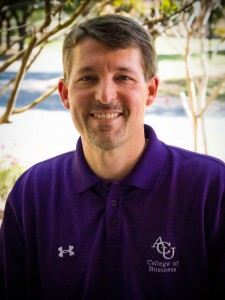
Dr. Brad Crisp
What is your work background?
My audit experience at Arthur Andersen was a fantastic way to learn about business. I spent a lot of time in nonprofit work. I worked for a brokerage firm, worked in real estate, for a tech start-up – which was actually one of the first internet providers, and on the consolidated financial statements for the U.S. government. It was a great way to learn about a lot of different organizations.
My experience in consulting allowed me to dive deeper into how organizations use both financial aspect and the systems aspect to execute tasks. I witnessed many interesting reactions to how technology is used. This is how I became interested in technology. It is just a piece of software, but people have different reactions to what it should do and how it should be used. This experience raised some interesting questions for me, ultimately leading me to pursue graduate work.
What do you teach at ACU?
I teach Systems Analysis and Design, which is a smaller project-based course focused on an organizational problem, where technology is part of the solution. I also teach Management Information Systems, which focuses on what business students need to know about technology and how information technology is used within the organization.
What committees/other duties do you have at ACU aside from teaching?
I am a sponsor of the ACU chapter of the Association of Information Systems, I am an advisory member of the student-run software company, Wildcat Software, and Director of the School of Information Technology & Computing, which is an academic unit within the College of Business Administration with majors in computer science, digital entertainment technology, information systems, and information technology. Most recently, I have been named Associate Dean for Graduate Business and charged with executing the launch of COBA’s new online MBA program.
What drew you to teaching?
I had a set of mentors that helped me begin thinking about academia not long after I graduated from college. Jack Griggs, former dean of COBA and one of my professors, would call once a year and ask about what I was going to do with my life. He encouraged me to think about being a professor. Also, when I was in Maryland, several of the folks that I met in church were professors. The interactions with them encouraged me to think about the benefits of being a professor, including teaching and research.
What’s the best part of working with students?
I am at ACU because I want to know students. During my first semester at ACU, I spent more time with students than during the five years I spent at Indiana. It wasn’t because I am a different person here, it was because the expectation was different. Students did not expect to to know their faculty and the reverse is true as well. ACU encourages those type of relationships and I enjoy spending time with students. I appreciate the opportunities to be involved in student organizations, go to chapel or lunch with students, have a chance to learn about what is important to them and be able to speak into their life in small ways.
Outside of teaching, what passions and hobbies do you have?
I spend a lot of time going to sports and other events for my sons. I like to play golf, sing on the praise team at Highland, and I serve on two nonprofit boards.
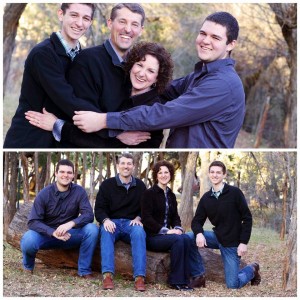
The Crisp Family
Do you have a good story from your early career in teaching?
When I was at Indiana, I was diagnosed with cancer and underwent surgery as part of the treatment. This was right before my third year of teaching. I remember how much that life event changed my perspective. During the process of recovery and going through radiation, being able to teach was a bright spot that provided a lot of joy during that time.
Tell me about a project or accomplishment that you consider to be the most significant
in your career.
I published some papers in journals and I’m very proud of those accomplishments. I don’t believe that most people understand how much time is involved in that process. There is a paper published a couple of years ago, that I worked on for about 15 years. This was a test of perseverance more than anything else, however, it was a great accomplishment.
I have also enjoyed consulting over the years. I wrote the business plan for one of the nonprofits that I serve and I have enjoyed seeing how far they have come.
I am proud of the recent ABET accreditation of the School of IT & Computing and in my work with curriculum revision, for the business core and now, in the creation of the MBA curriculum.
Who was your most inspirational professor and why?
Dr. Don Jackson, who taught economics, was a charismatic and enjoyable professor. He served as Deputy Director for Administration, Programs, and Resources at the National Security Agency (NSA) in the 1970’s and 1980’s. He often used the phrase, “I could tell you more, but I’d have to kill you.” Also as I mentioned before, Jack Griggs’ influence was definitely pivotal in my college experience and in my life.
If you could have a superpower, what would it be and why?
I would like to have the ability to slow down time.
What is something that students might be surprised to find out about you?
Right out of college, I was on a church planting team in Washington, D.C. and I also proposed to my wife on the summit of a mountain in Salzburg, Austria because her favorite movie is The Sound of Music.
What would you really want students and alums to know about you?
I would actually like for students to know that God creates each of us with purpose. I like to talk to students about how to find meaning in what you’re doing. For some, desire for meaning and faith may mean changing careers or going into ministry. For most of us, it means learning how to honor God in our daily lives. Having been involved in church planting, I believe it is easy to move across the country and say that you want to follow God. However, it is hard to actually live on a day-to-day basis in that way. More of following God, is in the process of making the small choices to serve him daily.
by M. C. Jennings | Sep 10, 2015 | Academics, Careers In..., COBA Events, COBA Faculty, College Decisions, Current Students, MBA, Mobile Learning, Placement stories, Research, Uncategorized
ACU will welcome the first class of its online MBA program this fall. I had the opportunity to sit down with Brad Crisp, COBA’s Associate Dean for Graduate Business, to learn more about the new program.
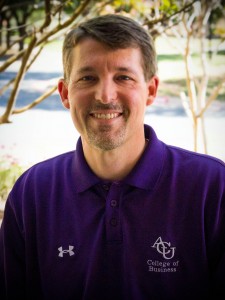
Why is ACU launching a Master of Business Administration program?
We offered a residential MBA for most of the 1980s and 90s, but it was difficult to attract the number of students that we wanted to serve in Abilene. With the launch of ACU Dallas, ACU is better equipped to serve graduate students through online programs. We now have the opportunity to reach a new market of graduate students who are established in their careers, yet wanting to be challenged and have the opportunity to grow professionally. The online MBA is the perfect vehicle for allowing them to continue their careers and attain their educational goals.
What is the focus of the curriculum?
The MBA curriculum is designed to equip students in four key areas:
- leadership skills that will enable them to lead in their career, but also in their homes, churches, and communities
- organizational innovation that prepares them to meet new opportunities
- decision-making that engages data available in today’s tech-driven workplace
- the ability to let faith and ethical principles guide their work
What role is COBA faculty playing in the creation of this program?
COBA faculty in Abilene designed the program and have played an important role in the development of the core courses that will be taken by all students. Additionally, some of the courses will be taught by our Abilene faculty, while other courses will be led by qualified faculty in Dallas and elsewhere.
How is graduate education different from undergraduate education?
Education ideally helps us think about theory and practice, that is, how we combine great ideas with implementation. One of the key differences in graduate education is that the adult learner has a greater amount of work experience to connect with the learning. Having an environment where students can bring their work experience into class discussions and on assignments is a key component of a professional program like the MBA. That is why I encourage students to work for a couple of years before making the transition to graduate education, because the knowledge gained in industry adds a great deal of depth to their graduate experience.
What excites you about the launch of this new program?
Most ACU faculty come to Abilene to teach the traditional undergraduate student, and we are excited to help students in that stage of their formation. Now we have decided that we aren’t stopping there. We have the chance to connect with adults in the next phase of their lives as they’ve grown in their careers, their communities, and their families. We have the opportunity to serve them in another important stage of their life, as they are learning where faith intersects with work and life.
For more information on ACU’s online MBA program, visit www.acu.edu/mba.
by M. C. Jennings | Aug 3, 2015 | Academics, COBA Faculty, Poverty and Development, Research, Uncategorized
During the month of May, Dr. Monty Lynn worked as a visiting researcher at World Vision in Washington, DC. World Vision is a Christian humanitarian organization dedicated to working with children, families, and their communities worldwide to reach their full potential by tackling the causes of poverty and injustice.
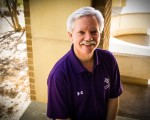
Dr. Monty Lynn, Professor of Management
Working with Dan Norell, a Senior Technical Advisor in Economic Development, and with a team of international professionals from World Vision, CARE, and Save the Children, Dr. Lynn participated in a research project using market-based approaches to enhance food security in developing countries.

While in Washington, Dr. Lynn met with representatives from several organizations including Bread for the World, ACDI/VOCA, USAID, and others. “Working with World Vision opened my eyes to the complexities of development programming. From securing funding to partnering with regional field offices to designing and coordinating sustainable food programs and measuring their impact—this is challenging work.” Dr. Lynn said that “Meeting with dedicated professionals in Washington and in early-morning teleconferences with professionals from Australia to Zimbabwe, I was impressed with the knowledge, passion, and skill of the World Vision staff. It was a blessing to be with them, even for a short period of time.”
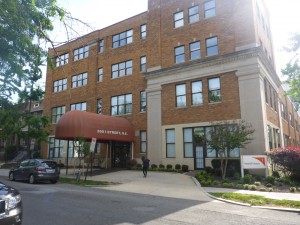
The Washington, DC offices of World Vision.
While serving as a visiting researcher, Dr. Lynn was invited to give a staff development presentation for the Washington office of World Vision on workplace spirituality. He hopes to visit at least one of the sites included in the research while on faculty renewal leave in fall 2015. “I’m thankful to the ACU College of Business Administration and to World Vision, and especially to Dan Norell, for an opportunity to learn and work alongside some of the best in the business.”
Join us on this blog as we follow and share Dr. Lynn’s work this fall.
by M. C. Jennings | Jun 10, 2015 | Academics, College Decisions, Current Students, Research, Uncategorized
COBA at Mini Cooper: June 8th by Ashton Darrow
Overall, Monday was great and full of Mini Coopers, marketing, and meeting people! We started out bright and early for the Mini Cooper factory tour just a few miles out of town.

After taking pictures of the vintage Mini Coopers we toured the manufacturing plant. We were able to see the start to finish line of the cars being manufactured.

We were all amazed at the quick precision of the robots in the factory that replaced human hands. After seeing the engines being built, we went to the portion of the factory where the car was painted and assembled in it’s entirety. Watching the custom-designed cars come off the line was fascinating.

After the tour of the manufacturing plant, we headed back to Oxford for a debriefing of all that we had learned. As a group, we discussed what we have learned about marketing from a real-life and global context.
Much of the afternoon was spent researching Asda and gathering market research on the streets. As a group, we learned how to approach people and discuss marketing in the real world.

COBA at Asda: June 9th by Bridget Fuessel
Today started with an early morning drive to the Asda store in Coventry.

This particular store was a concept model where they are trying out many different things to improve their customer’s experience.


The visit included an informational meeting, tour of the facility, and a short reflection and discussion time. In the short information meeting we learned the history of Asda and the external threats facing the brand and the UK grocery industry itself such as the high living costs consumers experience and the desire for efficiency in everyday life. After that, we got a tour of the store and learned what they are working on to bring more traffic inside and to make the consumers enjoy the time they spend doing their shopping.

To finish out our time at Asda, we had the opportunity to share our ideas, thoughts, feedback, and opinions with corporate managers who carved out time in their schedules to meet with us. And lastly, our day excursion ended with a group nap on the bus ride home. Today was much better than I expected and it was really cool to see how retailers do business and make decisions here in the UK!
by Neely Borger | Sep 26, 2013 | Academics, COBA Faculty, Research
Beginning September 1, 2013, Dr. Monty Lynn will begin his appointment as the W.W. Caruth Chair of Owner and Managed Business in the College of Business Administration. The appointment is a three year assignment and will include an annual stipend along with a research and travel budget to be managed by Dr. Lynn for the benefit of Abilene Christian University, COBA, and his own professional areas of interest. Dr. Lynn was also appointed to the chair from 2006-2009.
During the last appointment, Dr. Lynn used some of the endowment to prepare for the course, International Poverty and Development, and to attend a conference at Yale University and participate in microfinance training. For the current appointment, Dr. Lynn is planning on using the funds to invest more into COBA faculty and services.
“It is an honor to receive this title from COBA. I am excited to continue serving students and faculty through research, teaching, and service,” says Dr. Monty Lynn, recipient of the 2013-2016 W.W. Caruth Chair of Owner and Managed Business.

Dr. Rick Lytle praised Dr. Lynn on his esteemed work in the field of research and leadership. “Dr. Monty Lynn clearly exemplifies great leadership in COBA, the ACU community, and beyond. This honor could not be given to anyone more deserving.”
Dr. Lynn is a well-known professor in COBA, exemplifying honor, character, and diligence to his students and colleagues. His exceptional expertise in teaching, research, and service show his influential role in COBA, on the ACU campus and around the world. Congratulations to Dr. Lynn on his well-deserved appointment!
















